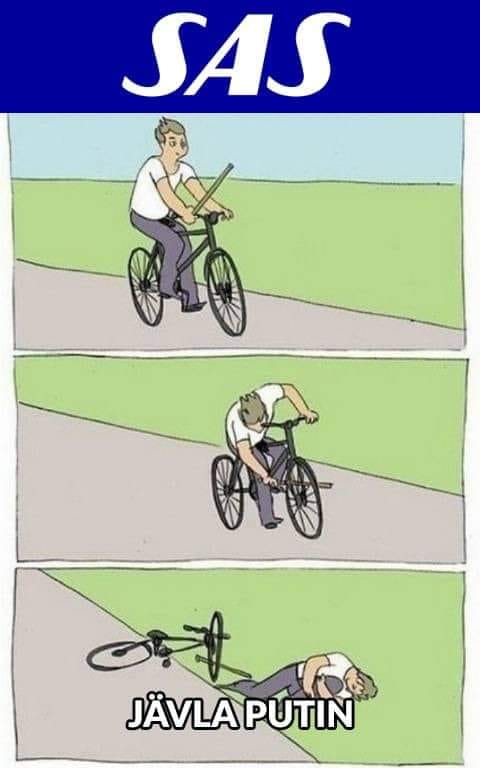Top Stories
Scandinavian Airlines: Get Woke, Cry Wolf
The message, in short: Nothing is genuinely Scandinavian. Be it meatballs or paternity leave, everything comes from other countries.

What is truly Scandinavian? Absolutely nothing. Everything is copied.
This was the slogan contained in a bizarre ad campaign broadcast earlier this month by Scandinavian Airlines (SAS), the largest airline in Scandinavia and the flag carrier of Norway, Denmark and Sweden. The ad was posted on YouTube, but was quickly edited and reposted after being flooded with bad reviews.
The message, in short: Nothing is genuinely Scandinavian. Be it meatballs or paternity leave, everything comes from other countries. While the Dutch, Germans and Americans have all made innovations, ours is “nada, niente,” the ad emphasizes. Then follows the unobjectionable cliché message that Scandinavian culture has been enriched by travel and cross-cultural influences.
For the past two weeks, SAS has faced a wave of criticism, ranging from ordinary Twitter users and opinion writers to leading politicians. Social media has been full of comments from people who vow never to fly with the company again—their own flag-carrier, 29 percent of which is owned by the Danish and Swedish state.
For anyone having trouble understanding why the ad has caused offense, imagine someone—say, Donald Trump—making the same claim about any other nation. Imagine them asking what is truly Mexican, Jewish or Palestinian, and then contending, “Absolutely nothing. Everything is copied.”

With 112,000-plus down-votes compared to 13,000-plus up-votes on YouTube as of this writing, this looks like a PR disaster. Get woke, go broke, as the saying goes. But it remains to be seen whether the campaign will have a lasting effect on the company’s brand.
However, this story isn’t just about a single episode of bad judgment at one company, as SAS’ bad-faith damage-control response arguably was worse than the original misfire: SAS got woke—then it cried wolf.
The day after the ad was released, the airline wrote in a press statement that it was investigating a suspected “attack” on social media—a theory which was uncritically picked up by leading international outlets. “When analyzing the pattern and volume of reactions we have reason to suspect an online attack and that the campaign has been hijacked,” SAS wrote in its statement.
Some media immediately began speculating on possible Russianinvolvement, a theory which the company did nothing to deny. Reuters claimed that the ad was simply “debunking myths about Scandinavia,” yet had nevertheless become “victim of an online hate campaign, particularly from nationalist and right-wing groups.”
The advertising agency’s offices in Copenhagen were in fact subjected to a bomb threat, which seems to have been a hoax. But SAS has not presented any evidence of a cyber attack. And although the ad has been widely shared in forums such as 4chan, experts have rejected the idea that the company was victim of a coordinated attack, either particularly by “right-wing groups,” or by Russia. And a number of mainstream Scandinavian media outlets and commentators had been among the most vocal critics.
But by evoking existing fears of right-wing extremism, online hate campaigns, and real threats to national security, the company was able to deflect basic journalistic scrutiny.

This damage-control strategy is more likely to work outside Scandinavia than within, since it requires some familiarity with the region to understand the outlandish nature of the ad’s message. SAS’ mode of crisis management might only add to the offense, as the company now is portraying perfectly reasonable people in one of the world’s most tolerant and multi-cultural regions as irrational and hateful.

While Reuters claims SAS was simply “debunking myths about Scandinavia,” the ad does no such thing. In fact, it gets a number of facts about the region wrong. For instance, the ad mentions parental leave, and features a Swedish dad with a baby carrier whispering “Thank you Switzerland.” Yet, Sweden was the first country in the world to introduce paid paternity leave, in 1974. Many Swedes take great pride in this fact, since paternity leave is seen as a symbol of Swedish gender equality.
Switzerland, which is much more conservative than progressive Sweden, did introduce maternity leave first, but it was the last country in western Europe to offer fathers paternity leave. It did so five months ago, 45 years after Sweden.

The ad also claims that Swedish meatballs may in fact be Turkish, which is actually an urban legend, long ago debunked. (The misunderstanding is most likely based on stories about an entirely different dish, namely the cabbage roll.)
In other cases, the ad debunks things that no one really seems to believe. For instance, I’ve never met anyone who thinks that the bike is a Scandinavian invention. Copenhagen is known for its love of the bike, true—but Danes don’t claim to have created it.
Here are some actual Scandinavian inventions not mentioned in the ad: the Celsius temperature scale, the pacemaker, the banknote, dynamite, Lego, Spotify, Skype, Carolus Linnaeus’ taxonomy, and Niels Bohr’s foundational contributions to quantum physics and our understanding of atomic structure. Scandinavia, in fact, has long been one of the most innovative regions in the world. The Nobel Prize—in memory of Alfred Nobel, the inventor of dynamite—is Swedish.
Indeed, the Kurdish-Swedish economist Tino Sanandaji has pointed out that it can be helpful to take a look at the periodic table by country of discovery to get an idea of how the Scandinavians have fared in terms of scientific contributions.
But of course, who cares about quantum physics or the discovery of new elements when there’s the origin of the meatball to be debated?
And now Scandinavia apparently has one more invention to claim, although it’s not one that should instill any of us with pride: a cynical new corporate strategy for deflecting criticism based on inflated or invented claims of online hate campaigns and Russian involvement—which, of course, will simply undermine public trust and public resolve in the face of realextremist campaigns and disinformation.






